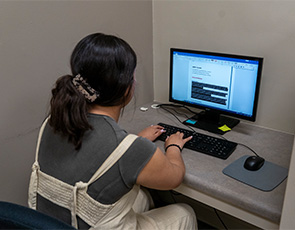In the most recent data from the National Center for Education Statistics, 20% of undergraduate students report having some type of documented disability. If you are a student seeking support and accommodations in college, you are in good company. Colleges are not only required to support you, but also many colleges, like Berry, are dedicated to ensuring every student can fully engage in campus life. Whether you are just starting your undergraduate degree or have recently received a disability diagnosis, this article will guide you through securing the support you need in college.
Defining Accommodations
College accommodations are services designed to address the needs of individual students with documented disabilities. These services ensure all students can participate fully in college learning environments and extracurricular spaces.
The most common accommodations address needs in housing, dining and the educational setting. Colleges typically have dedicated offices, sometimes called disabilities services or accessibility offices, and staff to work closely with these students. Many colleges have equitable opportunities and accommodations as part of their mission. However, colleges are also held accountable to offer these services to students with documented disabilities under the Americans with Disabilities Act and its amendments, Resolution 504 and the Fair Housing Act. Some colleges even offer federally funded inclusive learning designed for individuals ages 18–26 with an intellectual disability known as Inclusive Post-Secondary Education (IPSE) programs.
Students who will or even feel they may need academic, dining and housing accommodations for a documented disability are encouraged to connect with the Office of Accessibility Resources as early as their campus visit to learn more about how the office can support them at that institution. Knowing how supportive an Office of Accessibility Resources is may also influence a student’s decision to attend a certain college.
Accommodation Types
 Although there may be support needs that fall outside of these categories, typically accommodations are organized in these three areas:
Although there may be support needs that fall outside of these categories, typically accommodations are organized in these three areas:
- Academic accommodations
- Housing accommodations
- Dining accommodations
Each area captures part of the college experience. Academics are, of course, a part of any college journey, and academic accommodations can vary based on needs. Students may require accommodations such as extra time on tests, note-takers, captions for course videos and more.
Helping students understand academic accommodations, Berry College’s Associate Director for Accessibility Resources Katrina Meehan says, “Sometimes, students who are less familiar with learning disabilities don’t understand accommodations. I explain with a situation more students are more familiar with – visual impairment. I tell students to imagine calling a student who cannot read a whiteboard without glasses a cheater if they use their glasses. Students always react and agree wearing glasses is not cheating. Then I share that extra time on a test is a similar support to glasses. It allows a student with a processing disorder the additional time to process the information on the exam. It allows a student with diabetes to stop the clock on their exam when their blood sugar goes low, and they need access to food or drink.”
 Beyond the classroom, housing and dining experiences are areas where students build community and connect with their peers. For a school like Berry College where nearly all students live on campus, the housing experience builds a strong sense of belonging.
Beyond the classroom, housing and dining experiences are areas where students build community and connect with their peers. For a school like Berry College where nearly all students live on campus, the housing experience builds a strong sense of belonging.
Describing on-campus living, Associate Dean of Students Lindsay Norman said, “When students live on campus, college learning becomes a framework, a whole life experience. Students are not just taking classes at school. School is also where they eat, sleep, work and play, and they learn to take ownership of campus. Learning and maturing don't stop when students leave the classroom.”
By offering housing and dining accommodations, all students have access to this experience. However, both housing and dining accommodations often have earlier deadlines for students to disclose a disability. The deadlines are earlier for college staff to have more time to arrange for their needs.
Steps for Receiving Support
1. Contact the Office of Accessibility Resources
Students who need accommodations should start by contacting their college’s Office of Accessibility Resources to schedule a call, virtual meeting or in-person meeting to discuss options. While meeting or talking, ask for help finding all the college’s required paperwork or digital forms for disability documentation. In many cases, this information can also be found on the institution’s website.
2. Complete an Intake Form
This form will include basic information about students and their disabilities to open a digital file with the college. However, an intake form alone is not considered documentation.
3. Gather and Submit Supporting Documentation
This step is often the most complex for families and requires the most time. Disability documentation must be completed by the student's current medical or care provider. This cannot be done by the college's medical professionals. Then the forms must be delivered back to the college digitally or in paper form.
Although some providers may send forms back to the college for students, it is the student's responsibility to ensure the form has arrived. Documentation must:
- Clearly state the nature of the diagnosed disability or learning difference.
- Be written and signed by a qualified professional or healthcare professional.
- Be recent and speak to the student’s current needs.
- Provide a list of recommended accommodations.
If a student requests academic accommodations, many colleges prefer or require psychoeducational evaluations or neuropsych evaluations. Depending on the student’s diagnosis, their care provider can supply a letter to support the student’s request. Students should make the necessary arrangements for a care provider to complete accommodations forms or provide an updated evaluation before college starts. Some providers may require appointments while others require forms delivered to the office.
Even if the student had official documentation in high school, it is possible the same documentation will no longer be valid and may need to be updated to be valid in a college setting. Students should not assume that their documentation from high school will easily transfer to a college, and families and students must advocate for themselves between the high schools, colleges, physicians and Office of Accessibility Resources.
4. Meet with another staff member at orientation or before beginning classes
When advising students and parents, Meehan says, “The student is our most vital source of information for understanding how to support them once they submit documentation. During student meetings, they can share challenges from high school and talk about the accommodations they might need in college. We want to know our students beyond their forms and documentation, but jumping through the documentation hoops is still an important part of serving students well.”
Confidence is Key
We know college transitions can be tough. By getting the ball rolling on accommodations, you will get settled earlier and feel more confident about campus life. Reach out to the professional who can guide you and start your college adventure off on the right foot.



